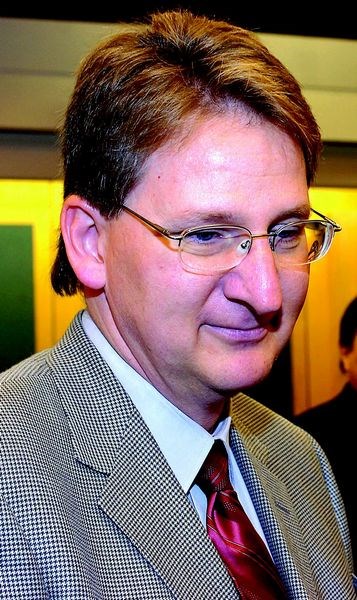Councillor Debora Munoz said she lived "in a state of absolute anguish" for three months as she carried the secret fellow councillor Brian Skakun illegally leaked the Kitty Heller report to the CBC.
The appearance of the Crown's star witness provided a dramatic flourish to the end of Wednesday's proceedings in a landmark case that may see Skakun prosecuted under provincial privacy laws for disclosing the confidential document.
Sporting a cast on her left arm, Munoz testified that a "jittery,"Skakun met her at work on Sept. 12 and confessed to her he leaked the report that detailed allegations of a romantic conflict of interest at Prince George's RCMP detachment.
"He told me he had handed it over to personnel at CBC but had not intended it to be published," said Munoz. "He said he was doing the right thing, that he was a messenger on behalf of the public."
Munoz said Skakun claimed he was "protected" under provincial whistleblower legislation. When he said he "felt like dying" over the leak, Munoz told him to think of his son Jacob and to talk to his fiance.
She was uncomfortable with the revelation and her discomfort increased as council sessions involving Skakun included decisions regarding the investigation into the leak.
On Nov. 3, Munoz said she implored him to confess to council.
"It was destroying him. But he said, 'My lawyer told me not to admit to anything,'" said Munoz.
Munoz then told Skakun she had to share what she knew, including notes she'd taken during their September meeting.
"He said, 'Fine, you want to do it that way, it's your word against mine,'" she said.
Munoz would contact Councillor Murry Krause, who arranged a meeting between Munoz, then Mayor Colin Kinsley and city manager Derek Bates in Dec. 2008.
Bates has testified that at that meeting, Munoz said she was concerned over her safety and had knowledge of Skakun's "past behaviour," including the slashing of tires.
Munoz said she'd known Skakun for eight years, and they'd lived with each other for eight months before separating in the run-up to the 2005 municipal election.
Ann Bailey also testifed Wednesday, via video conference. Bailey was the top civilian employee at the RCMP detachment who Heller cited in her report as being in a conflict of interest due to her personal relationship with Supt. Dahl Chambers, the city's top police officer.
Skakun's lawyer, Jon Duncan, asked Bailey repeatedly if she felt "vindicated" by the release of the full report CBC website in August 2008, which cleared her of any harassment charges. Bailey said the release only produced more embarrassment.
Skakun's lawyer has tried to claim the leak of the Heller report dates to a Citizen article in April 2008 rather than the August disclosure. That would contravene the statute of limitations of one year imposed under the regulation Skakun is being charged with violating, Section 30.4 of the Freedom of Information and Protection of Privacy Act. Skakun was charged in August 2009.
In other testimony, city manager Derek Bates said he was "a bit surprised" results of the probe, detailed in a report by the labour lawyer Heller, dismissed complaints by two detachment employees, Linda Thompson and Sheri McLean-Smith.
The city manager testified he expected their concerns to be substantiated after meeting with the pair and initiating the investigation by Heller.
A separate RCMP investigation detailed inappropriate comments and gestures made by Chambers towards city employees. The officer was disciplined internally and ordered to write letters of apology to Thompson, McLean-Smith and another civilian employee, Ken Corrigan.
Chambers was transferred to Vancouver in October 2009. Bailey, who the city paid a cash settlement to after threats of legal action in the wake of the report's leak, moved with him.
Bates declined to comment on his testimony.
The city's top official described the Heller report, which he received on Feb. 12, 2008, as "routine," noting the city's 750 employees and three unions generate a number of personnel issues.
Reiterating comments made by then mayor Colin Kinsley, Bates said he was also surprised Heller wrote of Bailey's conflict of interest. He testified Heller's conclusion was "not part of what I expected."
Heller wrote: "There is little doubt a reasonable person would conclude that this person (Bailey) could benefit from the relationship."
The labour lawyer also criticized Rob Whitwham, the city official in charge of the RCMP detachment, for being too casual about Bailey's relationship with Chambers.
Under cross-examination from Skakun's lawyer Jon Duncan, Bates said he reviewed the city's code of conduct with another city official, Kathleen Soltis, and concluded the Bailey-Chambers relationship did not contravene it.
Bates also testified he talked to Whitwham about the potential conflict prior to the completion of the Heller report and concluded it was not an issue.
Duncan also questioned Bates at length about RCMP documents Skakun gave the city manager in regards to an internal investigation of Chambers's conduct. Included in the documents was a letter of apology to city employee Ken Corrigan. Bates said he had requested the documents from the RCMP, but did not receive them from the police. He added he was "uncomfortable" receiving the documents and had still hoped to receive them through proper channels.
He asked Bates if Skakun had demanded the documents be put before council. Bates responded they only intended to meet on the documents and left them on his desk without comment.
Duncan also quizzed Councillor Don Bassermann at length about whether council decided to keep the Heller report confidential.
Bassermann testified council decided to keep an issue confidential if it pertained to the law, labour or land.
Also in afternoon testimony, Bates said he gave Whitwham a letter of apology on behalf of the city in the aftermath of the release of the Heller report on CBC. He testified Whitwham did not ask for the letter.



